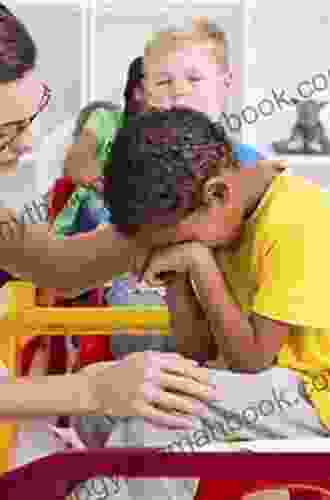Supporting the Journey of Teaching Children with Challenging Behaviors: An Expansive Guide for Educators, Parents, and Caregivers

Understanding Challenging Behaviors
Challenging behaviors are actions that interfere with a child's learning, social interactions, or overall well-being. These behaviors can range from mild to severe and may include:
5 out of 5
| Language | : | English |
| File size | : | 6871 KB |
| Text-to-Speech | : | Enabled |
| Enhanced typesetting | : | Enabled |
| Word Wise | : | Enabled |
| Print length | : | 198 pages |
| Screen Reader | : | Supported |
- Aggression (e.g., hitting, biting, kicking)
- Non-compliance (e.g., refusing to follow instructions, arguing)
- Self-injury (e.g., head banging, hair pulling)
- Social withdrawal (e.g., avoiding eye contact, not participating in group activities)
- Property destruction (e.g., breaking toys, tearing books)
It's important to note that challenging behaviors are not inherently bad. They are often a way for children to communicate their needs or cope with difficult emotions. By understanding the underlying causes of challenging behaviors, educators, parents, and caregivers can develop effective strategies to support these children.
Causes of Challenging Behaviors
The causes of challenging behaviors can be complex and multifaceted. Some common underlying factors include:
- Developmental delays or disabilities: Children with developmental delays or disabilities may have difficulty understanding and following instructions, which can lead to frustration and challenging behaviors.
- Sensory processing disorder: Children with sensory processing disorder may be over- or under-responsive to sensory stimuli, such as noise, light, or touch, which can lead to anxiety and challenging behaviors.
- Trauma or abuse: Children who have experienced trauma or abuse may have difficulty regulating their emotions and behavior.
- Mental health conditions: Children with mental health conditions, such as anxiety or depression, may exhibit challenging behaviors as a way of coping with their symptoms.
- Environmental factors: Children who live in poverty, experience homelessness, or have unstable family environments may be more likely to exhibit challenging behaviors.
Effective Interventions
There are a variety of effective interventions that can be used to address challenging behaviors in children. These interventions should be tailored to the individual child's needs and may include:
- Functional behavior analysis (FBA): An FBA is a process of identifying the underlying causes of challenging behaviors. Once the causes are identified, an individualized intervention plan can be developed.
- Positive behavior support (PBS): PBS is a proactive approach to managing challenging behaviors by teaching children appropriate behaviors and providing them with positive reinforcement.
- Behavior modification: Behavior modification uses rewards and consequences to shape children's behavior.
- Social skills training: Social skills training teaches children how to interact with others in a socially appropriate manner.
- Sensory integration therapy: Sensory integration therapy helps children to better process sensory information and improve their behavior.
- Medication: In some cases, medication may be necessary to manage challenging behaviors.
Role of Educators, Parents, and Caregivers
Educators, parents, and caregivers play a crucial role in supporting children with challenging behaviors. By working together, they can create a positive and supportive environment that promotes learning and growth. Here are some tips for supporting these children:
For Educators
- Be patient and understanding.
- Establish clear rules and expectations.
- Provide positive reinforcement for appropriate behavior.
- Use a variety of teaching strategies to meet the individual needs of all students.
- Collaborate with parents and caregivers to develop a comprehensive plan for supporting the child.
For Parents and Caregivers
- Be patient and understanding.
- Seek professional help early on.
- Work with your child's teachers to develop a comprehensive plan for supporting the child at home.
- Provide a positive and supportive home environment.
- Advocate for your child's needs.
Teaching children with challenging behaviors can be a challenging but rewarding experience. By understanding the underlying causes of challenging behaviors and using effective interventions, educators, parents, and caregivers can help these children learn, grow, and thrive.
5 out of 5
| Language | : | English |
| File size | : | 6871 KB |
| Text-to-Speech | : | Enabled |
| Enhanced typesetting | : | Enabled |
| Word Wise | : | Enabled |
| Print length | : | 198 pages |
| Screen Reader | : | Supported |
Do you want to contribute by writing guest posts on this blog?
Please contact us and send us a resume of previous articles that you have written.
 Top Book
Top Book Novel
Novel Fiction
Fiction Nonfiction
Nonfiction Literature
Literature Paperback
Paperback Hardcover
Hardcover E-book
E-book Audiobook
Audiobook Bestseller
Bestseller Classic
Classic Mystery
Mystery Thriller
Thriller Romance
Romance Fantasy
Fantasy Science Fiction
Science Fiction Biography
Biography Memoir
Memoir Autobiography
Autobiography Poetry
Poetry Drama
Drama Historical Fiction
Historical Fiction Self-help
Self-help Young Adult
Young Adult Childrens Books
Childrens Books Graphic Novel
Graphic Novel Anthology
Anthology Series
Series Encyclopedia
Encyclopedia Reference
Reference Guidebook
Guidebook Textbook
Textbook Workbook
Workbook Journal
Journal Diary
Diary Manuscript
Manuscript Folio
Folio Pulp Fiction
Pulp Fiction Short Stories
Short Stories Fairy Tales
Fairy Tales Fables
Fables Mythology
Mythology Philosophy
Philosophy Religion
Religion Spirituality
Spirituality Essays
Essays Critique
Critique Commentary
Commentary Glossary
Glossary Bibliography
Bibliography Index
Index Table of Contents
Table of Contents Preface
Preface Introduction
Introduction Foreword
Foreword Afterword
Afterword Appendices
Appendices Annotations
Annotations Footnotes
Footnotes Epilogue
Epilogue Prologue
Prologue Karen Dolby
Karen Dolby Kathryn Hughes
Kathryn Hughes Leela Punyaratabandhu
Leela Punyaratabandhu Grantlee Kieza
Grantlee Kieza Michael D Lewis Md
Michael D Lewis Md Artdax
Artdax Reia
Reia Akhil Reed Amar
Akhil Reed Amar Rolson St Louis
Rolson St Louis Steve Siebold
Steve Siebold Max Gorman
Max Gorman L J Trafford
L J Trafford Aja Barber
Aja Barber Michael Pool
Michael Pool Joanna Murray Smith
Joanna Murray Smith Chanel Miller
Chanel Miller Antti Tuomainen
Antti Tuomainen Hannah Pilnick
Hannah Pilnick Janine Marsh
Janine Marsh Akbar Cook
Akbar Cook
Light bulbAdvertise smarter! Our strategic ad space ensures maximum exposure. Reserve your spot today!
 Mason PowellAlto and Tenor Sax Duets: Unraveling the Seamless Orchestration of Two Iconic...
Mason PowellAlto and Tenor Sax Duets: Unraveling the Seamless Orchestration of Two Iconic... Avery SimmonsFollow ·14.9k
Avery SimmonsFollow ·14.9k Jesse BellFollow ·6.8k
Jesse BellFollow ·6.8k Vic ParkerFollow ·19.9k
Vic ParkerFollow ·19.9k Stan WardFollow ·3.2k
Stan WardFollow ·3.2k Glen PowellFollow ·9.1k
Glen PowellFollow ·9.1k Roger TurnerFollow ·5.4k
Roger TurnerFollow ·5.4k Gerald ParkerFollow ·7.3k
Gerald ParkerFollow ·7.3k José MartíFollow ·5.2k
José MartíFollow ·5.2k

 Christopher Woods
Christopher WoodsDeath's Second Chance: The Unbelievable Story of Cris...
On July 29, 2008, Cris...

 Esteban Cox
Esteban CoxFrom Ralphie Kids to Adolescents: The Journey to Manhood
The transition from...

 Chris Coleman
Chris ColemanLetters From Young Father Poems: Delving into the Heart...
Fatherhood, a journey filled...

 Holden Bell
Holden BellCounterintuitive Marketing: Achieving Great Results Using...
In the ever-evolving world of...
5 out of 5
| Language | : | English |
| File size | : | 6871 KB |
| Text-to-Speech | : | Enabled |
| Enhanced typesetting | : | Enabled |
| Word Wise | : | Enabled |
| Print length | : | 198 pages |
| Screen Reader | : | Supported |












